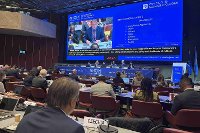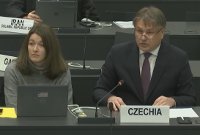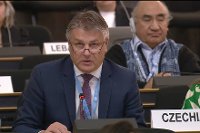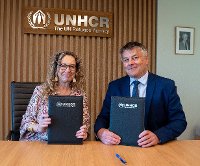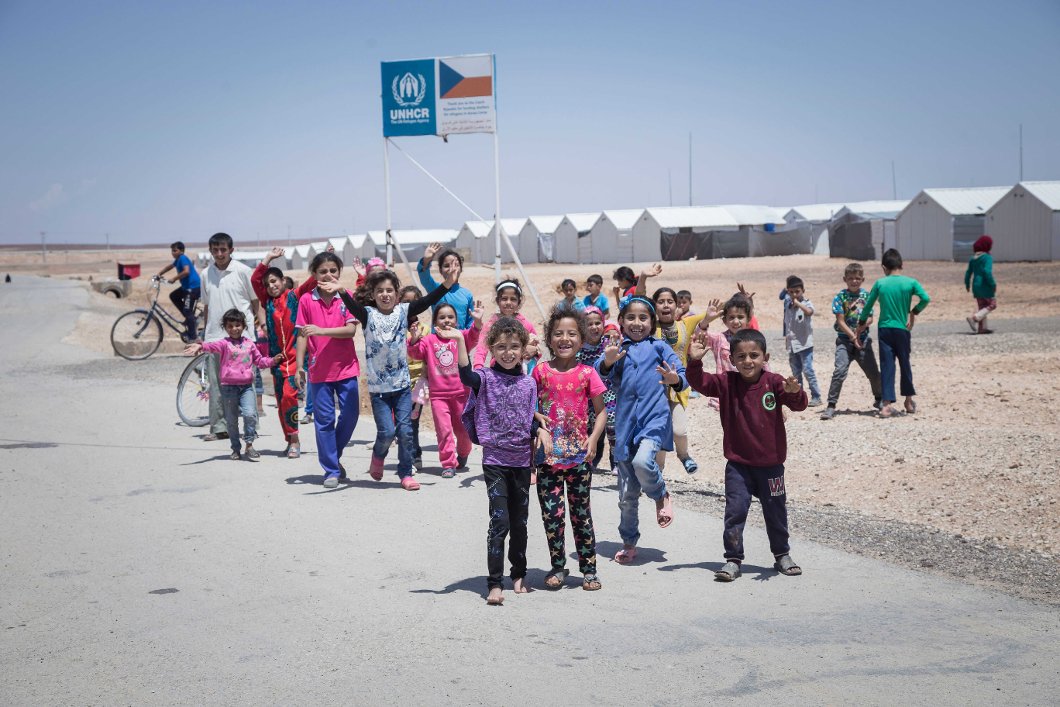
Migration and refugee issues
Czechia has been developing long-term cooperation with countries that are significant sources or transit areas of migration to the European Union. Particular emphasis is placed on regions in the immediate neighborhood of the EU. The aim of this cooperation is to contribute to the prevention and management of migration flows, support stability, and ensure the protection of people in need. Activities related to assisting refugees in third countries and supporting these countries in managing refugee crises represent a key element of the external dimension of the EU’s migration policy. At the same time, Czechia cooperates with the International Organization for Migration (IOM) and the United Nations High Commissioner for Refugees (UNHCR), both headquartered in Geneva.
Migration and refugee issues take an important place on Geneva agendas. Geneva is a headquarters of UNHCHR and IOM, and a venue for the Global Forum on Migration and Development meetings. In addition, several other Geneva based organizations also deal with these issues: Office of the United Nations High Commissioner for Human Rights (OHCHR), World Health Organization (WHO) or International Labour Organization (ILO), which are also part of the so-called Global Migration Group (GMG); inter-agency group bringing together heads of seventeen international organizations, agencies and programs within the UN to encourage the adoption of more coherent, comprehensive and better coordinated approaches to the issue of international migration.
To address its priorities in the field of asylum and migration, Czechia cooperates with the International Organization for Migration (IOM) – the intergovernmental organization with international legal personality which focuses on a wide range of migration management activities at a global level. In July 2016, an agreement making the International Organization for Migration a related organization of the UN was approved. Czechia has been a member of the organization since 1995. Through a branch in Prague, dozens of projects focusing on inter alia, integration of foreigners, assisted voluntary returns, prevention and combating of trafficking in human beings, and other migration issues, as well as projects with migration-related development aspects, have been carried out. The Ministry of Interior of the Czech Republic is responsible for the issue of international migration and international protection in Czechia.
When providing help for internally displaced persons and refugees, Czechia cooperates with The Office of the United Nations High Commissioner for Refugees (UNHCR), the international organization in the UN system which also deals with the issue of asylum seekers and stateless persons. It supports promoting international agreements dealing with refugees and it provides them with food and medical assistance. It was established by the United Nations General Assembly on 14 December 1950 and is governed by the United Nations General Assembly and the Economic and Social Council of the United Nations (ECOSOC). Czechia, in cooperation with UNHCR, is also engaged in resettlement programs of the most vulnerable refugees. The Ministry of Interior, in collaboration with the Ministry of Foreign Affairs, carries the responsibility for refugees and internally displaced persons.
Czechia has been developing long-term cooperation with countries that are significant sources or transit areas of migration to the European Union. Particular emphasis is placed on regions in the immediate neighborhood of the EU. The aim of this cooperation is to contribute to the prevention and management of migration flows, support stability, and ensure the protection of people in need. Activities related to assisting refugees in third countries and supporting these countries in managing refugee crises represent a key element of the external dimension of the EU’s migration policy. This policy is perceived not only as a tool for protecting refugees in their home regions but also as a means of supporting development and stabilization in third countries. In this context, emphasis is placed on linking migration policy with other areas of the EU’s external actions, such as foreign, development, humanitarian, trade, and security policy. Therefore, alongside standard tools of international protection, Czechia supports measures aimed at providing direct assistance to refugees in their regions of origin or in countries hosting large refugee populations. This support is seen not only as an effective use of resources but also as an expression of solidarity with countries affected by migration and with other EU Member States.
Specific instruments used by Czechia to achieve these goals include, among others, the MEDEVAC health program, which carries out medical missions and provides expert and capacity-building support in partner countries, and the Aid in Place program, which funds humanitarian and development projects directly in areas where initial displacement occurs or where large refugee communities are located. These programs allow for a flexible response to current migration and humanitarian situations while helping to reduce pressure on irregular migration to the EU.
At the European level, Czechia actively participates in the common approach to migration management through cooperation with EU institutions and agencies, such as the European Border and Coast Guard Agency (Frontex) and the European Union Agency for Asylum (EUAA). Czechia also supports the reform of European migration and asylum policy and takes part in negotiations on the new legislative framework in this area. In line with its migration policy, Czechia supports managed and legal migration, while striving to prevent and reduce irregular migration and provide protection to those who genuinely need it. Czechia consistently works to ensure the security and integrity of the EU’s external borders, primarily through cooperation with European partners and the use of available EU tools. At the same time, Czechia continues to provide assistance to people fleeing armed conflicts and other crisis situations, in accordance with the principles of international protection and solidarity.
Find more information about migration issues on the website of the Ministry of Interior of the Czech Republic.



